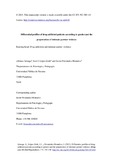Mostrar el registro sencillo del ítem
Differential profiles of drug-addicted patients according to gender and the perpetration of intimate partner violence
| dc.creator | Arteaga Olleta, Alfonso | es_ES |
| dc.creator | López-Goñi, José Javier | es_ES |
| dc.creator | Fernández-Montalvo, Javier | es_ES |
| dc.date.accessioned | 2018-04-13T15:55:51Z | |
| dc.date.available | 2018-04-13T15:55:51Z | |
| dc.date.issued | 2015 | |
| dc.identifier.issn | 0376-8716 (Print) | |
| dc.identifier.issn | 1879-0046 (Electronic) | |
| dc.identifier.uri | https://hdl.handle.net/2454/28268 | |
| dc.description.abstract | This study explored the differential profiles of drug-addicted patients according to gender and the perpetration of intimate partner violence (IPV). Methods: The study assessed a sample of 127 drug-addicted patients (84 male and 43 female) who sought treatment. Information about socio-demographic and consumption characteristics, IPV, psychopathological symptoms, personality characteristics and maladjustment variables was obtained. Four groups were created according to gender and the presence or absence of the perpetration of IPV: a) men with IPV (n = 41), b) women with IPV (n = 29), c) men without IPV (n = 43), and d) women without IPV (n = 14). The four groups were compared in terms of all of studied variables. Results: There were significant differences between the groups in the severity of the addiction and personality characteristics. In general, the drug-addicted patients with associated IPV perpetration exhibited greater scores for nearly all of the studied variables, independent of gender. Moreover, the differences among groups were more strongly related to perpetration of IPV than to the gender of the patients. Conclusions: According to the results obtained, treatment programs for drug addiction are a suitable context for identifying the presence of IPV, but IPV is typically unnoticed in addiction treatment programs. The implications of these results for future research and clinical practice are discussed. | en |
| dc.format.mimetype | application/pdf | en |
| dc.language.iso | eng | en |
| dc.publisher | Elsevier | en |
| dc.relation.ispartof | Drug and Alcohol Dependence, (2015), 155, 183-189 | en |
| dc.rights | © 2015 Elsevier Ireland Ltd. The manuscript version is made available under the CC BY-NC-ND 4.0 license. | en |
| dc.rights.uri | https://creativecommons.org/licenses/by-nc-nd/4.0/ | |
| dc.subject | Drug addiction | en |
| dc.subject | Intimate partner violence | en |
| dc.subject | Gender | en |
| dc.subject | Comorbidity | en |
| dc.subject | Assessment | en |
| dc.title | Differential profiles of drug-addicted patients according to gender and the perpetration of intimate partner violence | en |
| dc.type | Artículo / Artikulua | es |
| dc.type | info:eu-repo/semantics/article | en |
| dc.contributor.department | Psicología y Pedagogía | es_ES |
| dc.contributor.department | Psikologia eta Pedagogia | eu |
| dc.rights.accessRights | Acceso abierto / Sarbide irekia | es |
| dc.rights.accessRights | info:eu-repo/semantics/openAccess | en |
| dc.identifier.doi | 10.1016/j.drugalcdep.2015.07.018 | |
| dc.relation.publisherversion | https://doi.org/10.1016/j.drugalcdep.2015.07.018 | |
| dc.type.version | Versión aceptada / Onetsi den bertsioa | es |
| dc.type.version | info:eu-repo/semantics/acceptedVersion | en |



